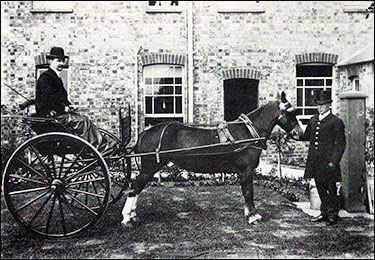|
SHOCKING SUICIDE NEAR ISHAM STATION – A BURTON LATIMER WOMAN’S RASH ACT
From: Northampton Mercury 14 January 1898
In the early hours of Sunday morning the driver of a goods train reported at Finedon Signal-box that a person had been knocked down by his train near to Isham station. The signalman thereupon proceeded down the line in search of the body. On arriving near Isham Station bridge a man was visible on the bridge, and the signalman asked what he was doing there. The man replied that he was in search of his wife, who was missing from home. A further search was made near by , and the body of the unfortunate woman was found on the goods line on the south side of Isham Station, near the Burton Latimer gas works. The woman was supposed to have stood in front of the train, was knocked down, the back of the head being smashed in. It turned out that the body was that of Emma Luddington, the wife of Cornelius Luddington, residing in High-street, Burton Latimer, and formerly of Hygot’s Lodge, Barton Seagrave. Mrs. Luddington, who had been medically attended since the week before Christmas has appeared strange in the mind. On Saturday night she retired to bed as usual; but on the husband awakening between two and three o’clock the following morning his wife was missing. He at once searched the surrounding outbuildings, but no trace of her could be found. He therefore extended his search, and taking the Station-road had reached the bridge crossing the lines when he was accosted by the signalman as stated. When the body was found, Mr. Fourt, the station master, was at once aroused, and P.C. Currin, of Burton Latimer, sent for. The body was removed from the lines to the station shed; but on account of the rats it was later conveyed to her home at Burton, where it awaits an inquest. The woman is about 38 years of age, and the husband is left with three small children.
It appears, writes our Wellingborough correspondent, that for some time deceased had been suffering from symptoms of mental derangement, which caused a suicidal tendency. She had been attended to by Dr. Burland, of Finedon, and latterly by Dr. Price, of Kettering. And the last-named had hinted that before long the poor woman would have to be sent away to an asylum. On one or two occasions the husband states she had threatened to do away with herself, and only recently had her with a note written to himself stating her intention to commit suicide. On Saturday night, however, she seemed no worse than usual, and went to bed about an hour before her husband, and was asleep when he retired.
Mr. J.T.Parker, divisional coroner, held the inquest at the Wagon & Horses Inn, Burton Latimer, on Tuesday afternoon. Inspector Lovett and Sub-Inspector Orchard represented the Midland Railway Company and Mr. W.J. Gross, was foreman of the jury.
In opening the enquiry, the Coroner said he thought the jury would have little difficulty in coming to the conclusion that the poor woman committed suicide whilst suffering from temporary insanity.
Cornelius George Luddington, the husband, who is a drayman in the employ of Messrs. Ellis and Everard, deposed that when he went to bed on Saturday night his wife was in bed, but when he awoke about two o’clock on Sunday morning he found she had gone. He went downstairs, and found she had gone. He went downstairs, and finding she had gone out he made a search for her round the premises, afterwards going to Isham Station, where he saw the signalman, who said he was just looking for someone who had been knocked down. Witness waited on the bridge whilst the signalman looked down the line, and in a minute or so called him, when witness went down and saw the body of his wife. The reason he went down to the station was that a week ago he found deceased writing a note, which he got away from her, and in this she had stated her intention of doing away with herself at Isham Station. Witness produced the note, but it was not decipherable owing to it having been carried about in his pocket.
The Coroner could pick out a few words: “I am suffering more than anyone knows”; “Don’t feel too much for me”; and “I grieve for you and the children.” She had been much depressed for some time owing to their having to move about and sell up their home. She had been attended by a doctor for her despondency, but he did not tell witness to put her under restraint. By the jury: Deceased was troubled because witness could not agree with her father, with whom they used to live.
David Giltrow, engine driver,46, Knox-road, Wellingborough, gave evidence that as he was driving a mineral train through Isham about three o’clock on Sunday morning, he thought he saw something in front of his engine. He did not feel his engine bump, but as he did not feel satisfied he stopped at Finedon and had a message sent to Isham.
Charles Winfield, signalman. Isham Station, said that on receipt of a message from Finedon he went out and saw the husband of the deceased on the bridge. He then went up the line and found the body of deceased on the up goods line just south of Isham bridge. She was quite dead. There was a severe injury on the back of the head, but otherwise the body did not appear to be injured. She was lying in the four footway, and was fully dressed with the exception of her hat.
The Coroner having briefly summed up, the jury returned a verdict that “Deceased committed suicide whilst suffering from temporary insanity.”
 |
Dr. Burland of Finedon who attended Emma in the early
stages of her illness |
|